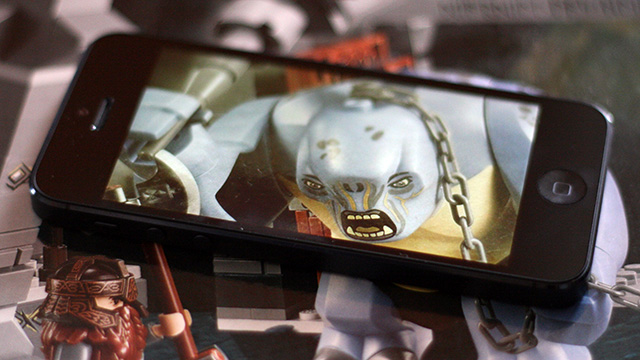
Lodsys got attention back in 2011 when it went after small app developers, demanding about one half-percent (.575 percent, to be exact) of their revenue if they use in-app purchases. By May of that year, Apple intervened in the legal action, arguing that since it had already licensed the Lodsys patents, developers should be protected.
Apple's intervention has hardly been a quick fix, though. Its argument has taken a mighty long time to get consideration in the East Texas court where it's fighting. And there's nothing to stop Lodsys from filing patent lawsuits against new targets—which is exactly what it's been doing. And Lodsys also believes its patents entitle it to royalties from websites that use certain types of "interactive chat, user feedback form, and survey features," enabling it to sue practically any company with a website.
In just one lawsuit filed last November, Lodsys claimed that charter.com (a cable company), lampsplus.com (a retailer), corbisimages.com (image licensing), and shop.nordstrom.com all infringed its two patents, numbered 7,620,565 and 7,222,078.
Last week, Lodsys fired off its latest round of lawsuits against several mobile game companies, including Paris-based Gameloft and Korean gaming shop Gamevil. It also sued The Walt Disney Company, claiming its mobile games also violated the two patents. One target, TLA Systems, makes a scientific calculator app called PCalc rather than games.
Many of Lodsys' cases have been consolidated into one, with discovery pushing forward and a trial currently scheduled for October 2013. That means that whatever the state of Apple's intervention, it hasn't been able to protect Lodsys targets from being forced into expensive and lengthy legal proceedings. It looks like the judge overseeing the case has decided the consolidated lawsuit must slog through discovery before Apple's arguments are considered.
Meanwhile, Lodsys is cashing checks. In October, Lodsys reported that it has convinced more than 150 companies to pay up, and that number is surely higher now. The consolidated case docket indicates Lodsys is wrapping up deals with major corporations. Atari, Take Two Interactive, Estee Lauder, and The Men's Wearhouse all settled in January.
Since the beginning of 2013, Lodsys has sued dozens of new targets. The lawsuits are based on the same two patents, and name user feedback and interactive chat features for various corporate websites as infringing. All the lawsuits are filed in Marshall, Texas—where Lodsys, like many so-called "patent trolls," claims to have an office. Some of Lodsys' latest targets include the following:
- In January, Lodsys sued Crocs (crocs.com), Oriental Trading Company (orientaltrading.com), Saks (saksfithavenue.com), Somerset Investments (bookbyte.com), General Motors (buick.com), Edmac Industries (edmac.com), Implix USA (getresponse.com) , Orchid Cellmark (orchidcellmark.com), Dr. Pepper Snapple Group (drpeppersnapple.com), and Jones Group (ninewest.com).
- In February, Lodsys sued 4imprint [PDF], BullionVault, PromoManagers, Retail Concepts, Steris Corp., Loews Hotels, OpticsPlanet, SuperValu, and Volkswagen of America.
- In April, Lodsys turned to mobile game studios. These lawsuits don't mention interactive chat, and so Lodsys appears to have gone back to suing over in-app purchasing, rather than the user feedback and chat claims it has made against retailers earlier. In a batch of suits filed April 1 and 2, Lodsys sued Gameloft [PDF], BackFlip Studios, Gamevil [PDF], Jirbo [PDF], MobileAge [PDF], Pocket Gems [PDF], Sunstorm Interactive, TMSoft [PDF], TLA Systems [PDF], and The Walt Disney Company [PDF]. Those targets are mostly, but not exclusively, game developers.
Each of the mobile gaming suits names one example of an infringing app. For example, the complaint against Gameloft names Real Soccer 2012, and the suit against Disney names Where's My Water?
While Lodsys first gained a bad reputation for going after small developers, the company has clearly shown it's ready to wage patent battles with foes large and small. Just looking at the mobile gaming lawsuits, the targets range from quite large (Gameloft with 5000+ employees) to medium-sized (Pocket Gems with about 150 workers), to the apparently quite small (TLA Systems).
The continued filing of lawsuits, together with the fact that interventions by both Apple and Google have failed to stop the rampage, inspired a blog post from EFF last week, entitled "Lodsys is back. It's time to beat this troll."
"We hadn't heard anything ... from Lodsys in the meantime and assumed (foolishly, perhaps) that it was waiting to see what the judge said," wrote EFF staff lawyer Julie Samuels. "This week, that all changed."
The EFF post directs developers to an FAQ about Lodsys and offers help for defendants looking for lawyers. But it seems unlikely that patent campaigns like the Lodsys one can be put down without some overall reform to the system. If the Lodsys case proves anything, it's that the vigorous intervention of "big guys" like Apple and Google can't always stop a patent holder determined to extract payments from smaller targets.
reader comments
85